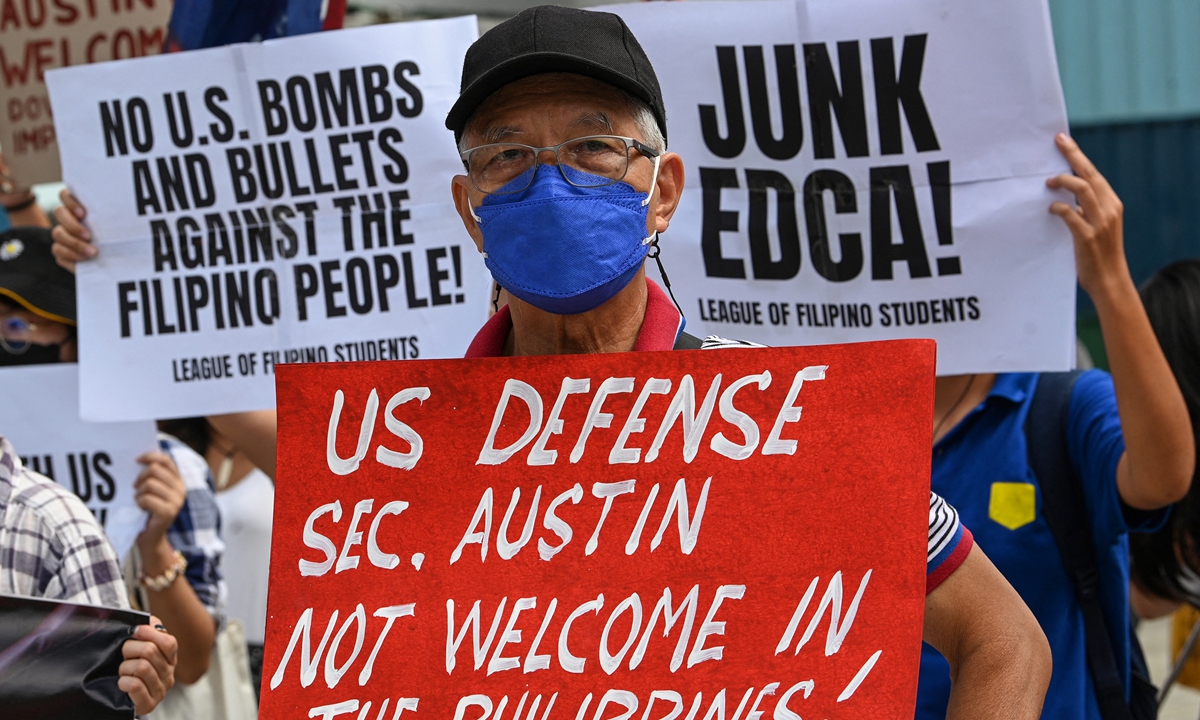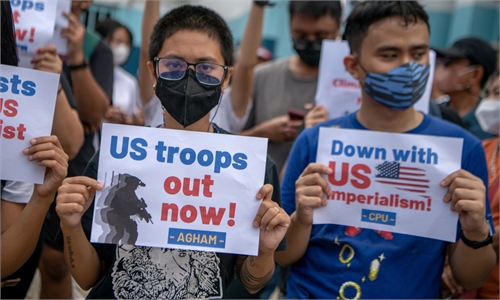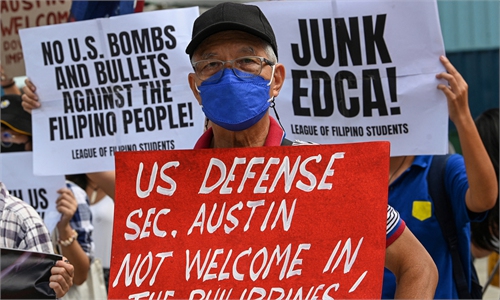US making Philippines a pawn as it pushes for access to more military bases: expert

Philippine protesters hold anti-US placards during a rally in front of the military headquarters in Quezon City, suburban Manila on February 2, 2023, during US Secretary of Defense Lloyd Austin’s visit to the Philippines. The two countries announced a deal on February 2 that will give US troops access to another four bases in the Southeast Asian country. Photo: AFP
The US is attempting to make the Philippines a pawn in countering China, and its actions are endangering multilateral security cooperation mechanisms in Southeast Asia, experts warned on Tuesday after the two countries reportedly announced new sites for US military bases.
The US and the Philippines will announce new sites as soon as possible for an expanded Enhanced Defense Cooperation Agreement (EDCA), giving access to military bases in the Southeast Asian country, Reuters reported on Monday. Under the agreement, the bases will allow the US military to deploy its troops, weapons, and equipment.
US Air Force Secretary Frank Kendall met Philippines’ defense chief Carlito Galvez in the capital Manila, according to the report.
The US and the Philippines announced a deal in February that would give the US access to four more military bases in the Philippines. Chinese Foreign Ministry spokesperson Mao Ning denounced the move on February 2, saying the US is holding onto a zero-sum mentality and keeps strengthening military deployment in the Asia-Pacific, which will escalate tensions and endanger peace and stability in the region.
To bundle the Philippines into the “chariots of geopolitical strife” will seriously harm Philippine national interests and endanger regional peace and stability, the spokesperson for the Chinese Embassy in the Philippines said in a statement released on March 12.
Chen Xiangmiao, director of the world navy research center at the National Institute for South China Sea Studies, told the Global Times on Tuesday that it’s clear that the moves are part of US efforts to strengthen its military presence near the Taiwan Straits, which will increase tension in the region, as well as endangering regional peace in the South China Sea.
The US is dragging the Philippines into the competition between China and the US and is making it a pawn, which will cause more concern and anxiety in the region, said Chen.
Analysts said that the US has long been manipulating behind the scenes to create a sense of insecurity and tension in the Philippines, including persuading domestic people to believe the so-called “China-threat” theory, and making it more acceptable for the US to build military bases in the Philippines. However, there is growing concern among people in the Philippines about the country moving closer to the US militarily, and some protesters have voiced outrage over the decision of the government to allow the US access to four more military facilities.
“Participating in any war does not serve our national interest. We must never allow our territory to become a launch pad for an offensive attack against another state,” former Philippine presidential spokesperson Harry Roque wrote in an article published in the Daily Tribune on February 7.
Members of different organizations in the Philippines have been protesting and have called on the senate to investigate the locations agreed with the US, according to media reports.
From March 22 to 24, Chinese Vice Minister of Foreign Affairs Sun Weidong will travel to the Philippines to co-chair the 23rd China-Philippines diplomatic consultation and the seventh meeting of the Bilateral Consultation Mechanism on the South China Sea with Undersecretary of the Department of Foreign Affairs of the Philippines Theresa P. Lazaro. It will be the first face-to-face bilateral consultation between the foreign ministries since COVID-19 began, Chinese Foreign Ministry spokesperson Wang Wenbin said at Monday’s press briefing.
Wang said that the two sides will also have in-depth communication on properly handling maritime disputes and advancing practical maritime cooperation, and will exchange views on international and regional issues of shared interest.


